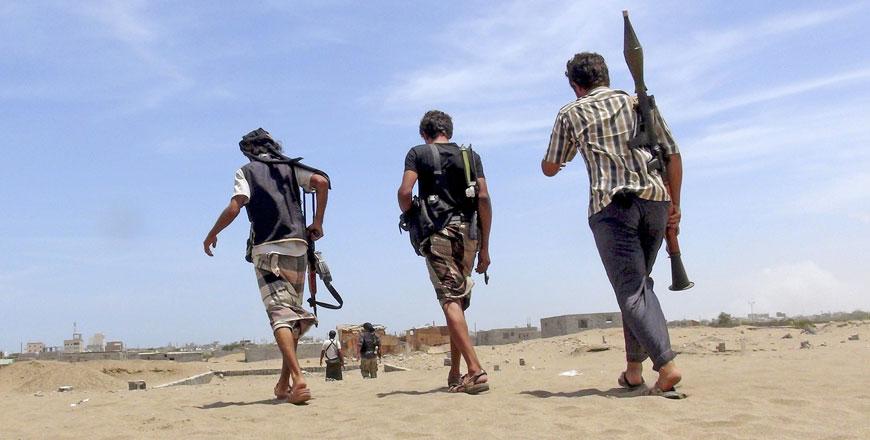You are here
Shiite militia seizes Yemen president’s chief of staff
By AFP - Jan 17,2015 - Last updated at Jan 17,2015

SANAA — Shiite militiamen in control of Yemen's capital seized President Abed Rabbo Mansour Hadi's chief of staff Saturday in a new challenge to his leadership of the violence-plagued country.
The abduction of Ahmed Awad Bin Mubarak, who heads a "national dialogue" on Yemen's political transition, came shortly before he was to attend a meeting on a proposed new constitution opposed by the Houthi militia.
Yemen has been dogged by instability since the ouster in 2012 of strongman Ali Abdullah Saleh, with the Houthis and Al Qaeda seeking to fill the power vacuum.
The Houthis are widely believed to be backed by Saleh.
Al Qaeda in the Arabian Peninsula (AQAP) also has a record of acting well beyond its Yemeni base, and claimed responsibility for the January 7 attack on French satirical magazine Charlie Hebdo that killed 12 people.
Yemeni authorities said Saturday they had arrested two Frenchmen for questioning over suspected Al Qaeda links.
The Charlie Hebdo attackers, French brothers Said and Cherif Kouachi, are known to have trained with Al Qaeda in Yemen.
“There are around 1,000 Al Qaeda militants in Yemen from 11 Arab and non-Arab countries,” national security service chief, General Mohammed Al Ahmadi, told reporters.
Mubarak and several companions in his armoured car were stopped by militiamen in Houthi tribal clothes in the southern Hada district, a witness said.
He was seized and driven to an unknown location, an official from the national dialogue secretariat told AFP.
Ahmadi said talks were under way to secure his release.
In a statement, the militia said Mubarak’s detention was necessary to prevent a UN-brokered agreement between the presidency and them in September “from being broken,” without clarifying Mubarak’s role.
The “national peace and partnership agreement” was signed in September as the Houthis overran Sanaa.
It called for forming a new government and appointing Houthi advisers to Hadi, and for Shiites to withdraw from key state institutions they had seized.
Mubarak’s kidnap came just before a meeting of the national dialogue secretariat to present a draft constitution that stipulates dividing Yemen into a six-region federation, which the Houthis oppose.
Political sources told AFP representatives of the Houthis and Saleh’s General People’s Congress Party walked out of a meeting headed by Hadi on Saturday to discuss the political process, including the constitution.
The Houthi statement warned Hadi of an unspecified “series of special measures” they are planning, adding that “President Hadi must not cover up corruption”.
Hadi has struggled to assert his authority since the Houthis seized Sanaa.
‘Foreign orders’
In a speech published by state news agency Saba, Hadi said “our problems must be solved by wisdom and common sense, and without resorting to violence such as kidnappings and killings”.
“Those who are attempting to hamper [the political process] must realise that we are on the right path and they cannot hamper this national process,” saying that such parties could be receiving “foreign orders”.
Yemen has repeatedly accused Shiite-dominated Iran of backing the Houthis.
Dozens protested in Sanaa and other cities Saturday against the Houthis and against Al Qaeda.
“Hadi you traitor. You have sold Yemen to Iran,” they chanted. “Revolt, revolt youth against Houthis and terrorism.”
Mubarak, a southerner, was one of the representatives in the dialogue of the Southern Movement, which seeks autonomy or secession for the formerly independent south.
Hadi named him as prime minister in October, but he turned down the job following strong opposition from the Houthis and from Saleh’s party.
Hours after his kidnap, leading southern political, tribal and media figures threat after a meeting in Sanaa to suspend their membership in “all [state] institutions” if Mubarak is not released “within 24 hours”.
Mubarak’s abduction comes a day after one of two Houthis appointed by Hadi as advisers last year announced he was quitting because his advice had been spurned.
Since their takeover of the capital, the Houthis have pressed their advance into mainly Sunni areas south of Sanaa, where they have met deadly resistance from Sunnis, including Al Qaeda loyalists.
The turmoil has raised fears that Yemen, which neighbours oil rich Saudi Arabia and lies on the key shipping route from the Suez Canal to the Gulf, may become a failed state similar to Somalia.
Related Articles
Shiite militia fought deadly battles with the army in Yemen's capital on Monday before a ceasefire took hold, in the biggest challenge yet to President Abed Rabbo Mansour Hadi's rule.
Shiite militia fighters attacked Yemeni President Abed Rabo Mansour Hadi's residence and seized the presidential palace Tuesday in what officials said was a bid to overthrow his embattled government.
SANAA — Armed tribesmen killed 18 Houthi fighters in an ambush in Yemen's central province of Ibb on Tuesday, residents said, in one of the














